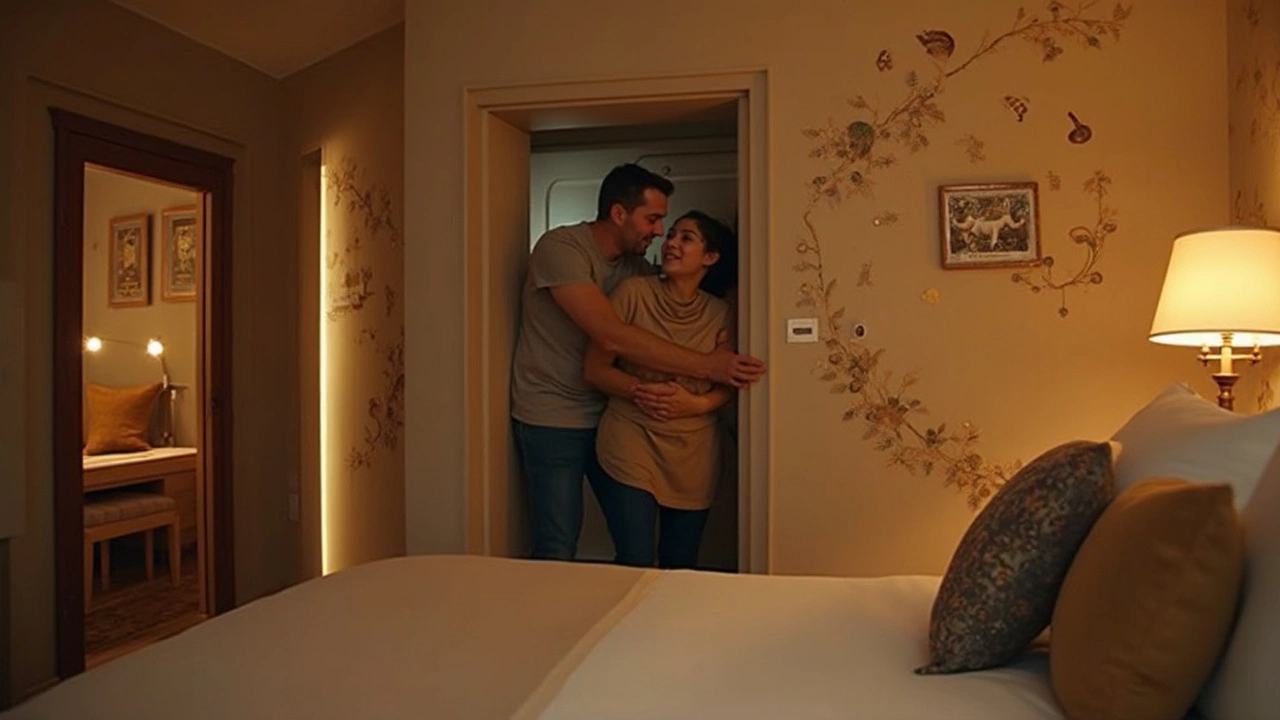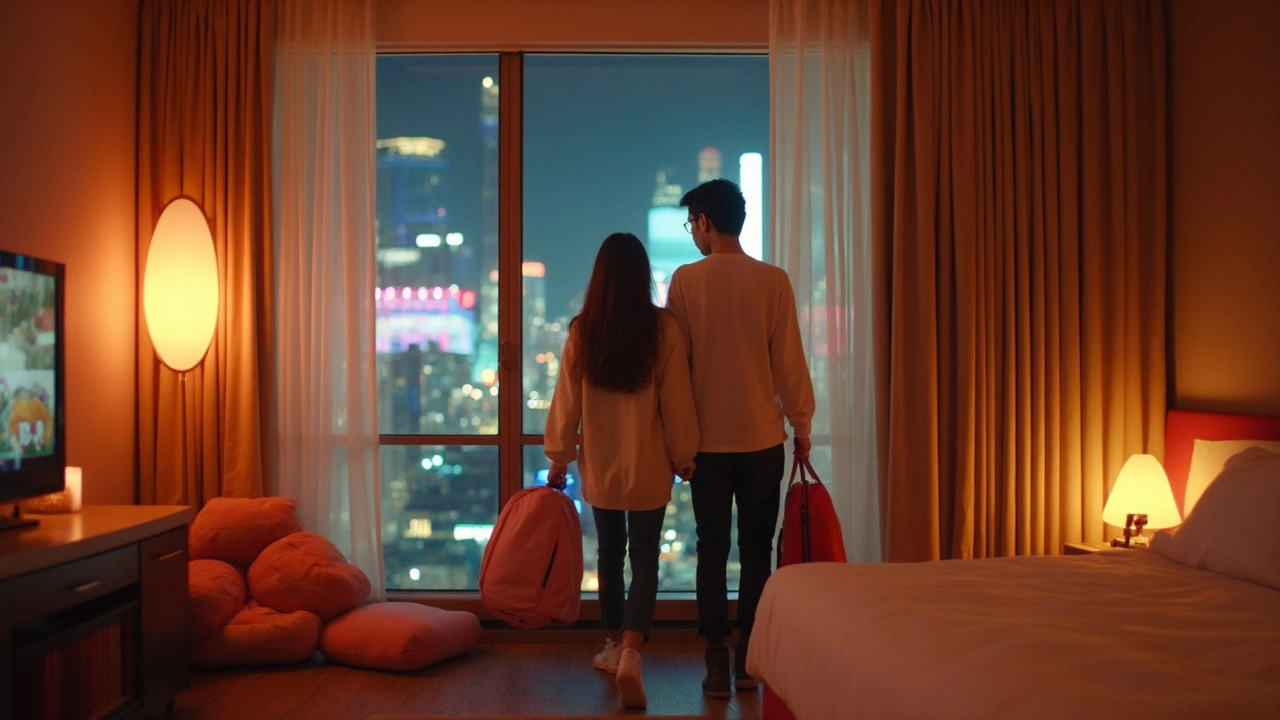Do Love Hotels Still Exist? Modern-Day Secrets of Romantic Stays
8 Jun, 2025Admit it—you've wondered if those quirky love hotels from movies are still around. Maybe you've walked past a neon-lit building while on vacation and thought, “Could people really still be using these places?” Spoiler: yes, love hotels are far from extinct. In fact, in some countries, they're full-blown tourist attractions.
If you picture sketchy, outdated rooms, you’re way off the mark. Many modern love hotels are surprisingly stylish and high-tech. In Japan, you’ll find options decked out with karaoke, jacuzzis, and beds that honestly put my own mattress to shame. It’s not just about secrecy anymore—these hotels are all about fun themes and next-level comfort.
Outside Japan, love hotels have adapted to local tastes. Some go by “romance hotels” or “boutique couple suites,” but at the core, they're catering to couples who want privacy and a bit of adventure. If you’re traveling with a partner, it’s worth knowing how these places work—and why people keep checking in, even in the age of Airbnbs and snooping smartphone cameras.
- The Origins and Rise of Love Hotels
- Where Love Hotels Still Thrive Today
- What Actually Happens Inside
- The Privacy Factor: Why People Still Book Them
- Modern Updates: The New Age of Themed Rooms
- How to Find and Book a Love Hotel Yourself
The Origins and Rise of Love Hotels
If you’re curious where the whole love hotels thing started, you’re not alone. These places popped up first in Japan after World War II, during a time when space was tight and privacy at home was nearly impossible. By the late 1960s, the term "love hotel" actually came from the Hotel Love in Osaka. The idea was simple: private rooms where couples could rent by the hour instead of the night.
Back then, Japan was still big on tradition and tiny homes, so sneaking away for alone time wasn’t easy. Love hotels filled the gap, offering a no-questions-asked escape for couples young and old. By the 1980s, there were more than 30,000 of these hotels across Japan—that’s more than all of the country’s McDonald’s and KFC restaurants combined at the time.
The idea didn’t stay in Japan. As the trend caught on, parts of South Korea, Taiwan, Brazil, and even European cities like Paris started offering similar short-stay hotels. They tweaked the theme to match local tastes, but privacy and convenience were always at the center. In big cities, especially where folks share apartments or live with family, these hotels became a go-to option for a little romantic adventure.
And no, these weren’t just shady back-alley spots. In Japan especially, love hotels became an accepted part of everyday life, with bright signs and creative architecture designed to stand out. Today, that culture is still going strong in Tokyo’s Shibuya and Shinjuku districts, where you’ll spot wildly themed buildings you couldn’t miss if you tried.
Where Love Hotels Still Thrive Today
If you think love hotels have faded away, that’s not the case. These places are still a hit, especially in Japan. Walk around Tokyo’s Shibuya or Osaka’s Umeda districts and you’ll spot buildings with bold, colorful signs advertising rooms by the hour—or overnight. According to a 2024 report from the Japan National Tourism Organization, there are still more than 9,000 love hotels across Japan, pulling in an estimated $4 billion a year. That’s not some small niche business—it’s huge.
And it’s not just Japan. In South Korea, love hotels remain a go-to for couples (married or dating) who want real privacy. Seoul has entire neighborhoods packed with these hotels, sometimes called “motels” locally. Brazil has its own take too, with the famous “motel” industry around Rio de Janeiro and São Paulo offering everything from mirrors on the ceiling to themed fantasy suites. Even in Europe, cities like Paris and Amsterdam have discreet boutique hotels advertising privacy and unique themes—just with a more upscale twist.
| Country | Estimated Number of Love Hotels | Unique Features/Notes |
|---|---|---|
| Japan | 9,000+ | High-tech rooms, unique themes, karaoke |
| South Korea | 5,000+ | Digital check-in, soundproofing, budget options |
| Brazil | 3,000+ | Huge suites, jacuzzis, fantasy rooms |
These hotels thrive because they fill a real need. In countries where people live with family longer, or share small apartments, having a private place for romance is a big deal. Another reason is the fun factor—some folks just love a well-designed themed room or a cheeky adventure.
If you’re looking for a love hotel that feels comfortable for tourists, Japan is your best bet. Many places now have English-language booking, discreet entrances, and payment by machine for total privacy. Just double-check if you need to book ahead—these popular spots fill up fast, especially on weekends.
What Actually Happens Inside
So, what's really going on behind those doors? First off, love hotels are all about privacy and convenience. Most places keep interactions to a minimum—a lot of hotels even let you check in and pay through a kiosk or tiny window so you barely see the staff. Some in Japan have touchscreen menus where you pick your room by theme and see real photos of what you’re getting. Fast and discreet is the name of the game.
Inside, you’ll usually find rooms made for way more than just sleeping. Think mood lighting, soundproof walls, king-sized beds, and a big focus on cleanliness. In top locations, you get perks like whirlpool tubs, karaoke machines, PlayStation consoles, and even vending machines with, well, adult products. The minibar in these rooms often has a wider selection than your average hotel, and you’ll almost always find free toiletries and some quirky extras—like costumes, or a massage chair you won’t want to explain in a Zoom call later.
Here’s the usual routine for guests:
- You pick the room style on a touch panel or at reception—some places use screens so you never even talk to anyone.
- Pay per hour or for the night, and you get your key or access code. This setup is way more common in Asia, but some European and American hotels have caught on too.
- Once inside, the whole vibe is focused on creating a private, judgment-free zone. Stay as long (or as short) as you want, and leave without anyone inquiring about your plans.
Cleaning is super fast and discreet, done by staff who are trained not to ask questions or make you feel awkward. Some hotels go the extra mile, swapping linens through hidden doors so you never cross paths with anyone.
While the main draw is privacy for couples, some people just use love hotels as a creative getaway or a secret spot to binge-watch Netflix somewhere with a giant jacuzzi. No shame in that at all—especially if you want a fun escape without running into half your neighborhood at the lobby bar.

The Privacy Factor: Why People Still Book Them
If there’s one thing love hotels are famous for, it’s their top-level privacy. People don’t just go for wild rooms—they go to dodge awkward hallway run-ins and judgmental glances at check-in. In Japan, booking is often done automatically at a kiosk, and you might never have to talk to a staff member or even show your face. Some hotels have parking garages with curtains that cover your license plate. You check in, do your thing, and check out, all without the world (or nosy relatives) knowing a thing.
Why is this such a big deal? For a lot of couples, privacy is more than a luxury—it’s a must-have. People living with roommates, folks in strict families, or even celebrity couples who'd rather not get snapped by paparazzi—they all value these getaways. In fact, a study from Japan’s Love Hotel Research Institute in 2022 found that over 60% of guests said privacy was their main reason for booking.
"A love hotel’s value is how much peace of mind it can give couples who just want to enjoy each other’s company, without outside eyes," says hotel industry analyst Hiroshi Okada. "Convenience and comfort come second to the need for a safe, discreet spot."
This isn’t just a Japan thing. Cities like Paris, Seoul, and even parts of the US have love hotels or "romantic suites" that specifically market privacy and anonymity. Some American hotels have special side entrances or self-check-in tablets, all in the name of not getting spotted by anyone you know.
Here’s a quick snapshot of what these places commonly offer for privacy:
- Unmarked entrances and exits
- Anonymous or automatic payment methods
- Soundproofed rooms
- Private in-room dining and vending machines
- Hourly rates so you don’t have to spend all night if you don’t want
| Country | Anonymous Check-in (%) | Hourly Rate Option (%) |
|---|---|---|
| Japan | 94 | 100 |
| South Korea | 87 | 95 |
| France | 72 | 79 |
| USA (select cities) | 61 | 68 |
So yeah, the next time someone asks why people still book love hotels, you can say it’s not just about the heart-shaped bathtubs. It’s about having the room, the time, and most of all, the privacy to actually enjoy them.
Modern Updates: The New Age of Themed Rooms
Walk into a love hotel today, especially in places like Tokyo or Seoul, and you’re just as likely to find a space pod or a retro disco suite as a basic double bed. These hotels are all about totally different vibes, with some spots even letting you pick a room by pressing a button next to a backlit photo—no awkward lobby chats required.
Let’s get specific. In Japan, about 30% of love hotels are now “themed,” catering to way more than just privacy seekers. Themes run wild: think jungle, prison cell, underwater, and even Hello Kitty. Some fancier hotels throw in features like 4K TVs, PlayStation consoles, or private saunas. In South Korea, you’ll see everything from urban loft to movie theater-inspired rooms. Several chains post room photos and details on easy-to-browse websites, making booking totally modern—no surprises except the ones you want.
Check out what today’s love hotels offer in different countries:
| Country | Popular Themes | Typical Extras |
|---|---|---|
| Japan | Spaceships, Trains, Anime, Jungle | Jacuzzis, Karaoke, Mood Lighting |
| South Korea | Industrial Loft, Movie Set, Penthouse | Rain Showers, Free Snacks, Netflix |
| Brazil | Fantasy, Tropical, Baroque | Private Pools, Mirrors, Room Service |
| France | Chic Boudoir, Secret Hideaway | Wine Tubs, Designer Toiletries, Gourmet Minibar |
If you’re all about tech, there are even hotels letting you reserve and check in with just your phone. Some use keyless entries or rotating doors, so you never have to explain your plans to a stranger at the counter. Others advertise hourly rates on apps, meaning you can grab a spontaneous escape without extra hassle.
One tip: It pays to research the hotel’s photo gallery first. Some stick to very basic rooms, while others go all out. Look for guest reviews or Instagram tags for a real feel. And don’t be shy—modern love hotels are set up for everything from anniversaries to playful staycations. With trends showing steady demand, it looks like themed rooms aren’t going anywhere.
How to Find and Book a Love Hotel Yourself
Tracking down a love hotels can be surprisingly easy or just a bit tricky, depending where you are. In Japan, it's as simple as walking down certain streets in Tokyo's Shibuya or Osaka’s Namba district—colorful signs and themed façades kind of give them away. But in other countries, you have to dig a little. Here’s exactly how to find and book one without hassle.
- Check Local Apps and Sites. In Japan, try the popular app Happy Hotel or the website Ikebukuro Lovehotel Guide. Other countries might list romance hotels on platforms like Agoda, Expedia, or Booking.com, often under ‘adults only’ or ‘boutique’ categories.
- Look for Walk-in Options. Unlike standard hotels, most love hotels don’t need or even accept advance bookings—especially in Japan. You just pick a room from a panel at the entrance, pay at a machine, and head in. Some even let you stay anonymously.
- Check In or Out at Odd Hours. Many love hotels offer both “rest” (short stay, usually 2-4 hours) and “stay” (full night). “Rest” is cheaper, and you can sometimes snag cool themed rooms that wouldn’t be available for overnight guests.
- For Privacy, Go Cash. Plenty of love hotels still don’t require ID if you’re paying in cash. It’s common to never see any staff at all—just an automated check-in screen or a frosted glass window.
If you’re worried about language barriers, most major city hotels use clear symbols, numbers, and pictures for selecting rooms. And if you’re in a place like South Korea or Brazil, the vibe is just as easy and private. Online ratings and reviews can help you spot the best options.
| Country | Website/App | Booking Style |
|---|---|---|
| Japan | Happy Hotel / Ikebukuro Lovehotel Guide | Walk-in, App |
| South Korea | Yanolja App | App, Walk-in |
| Brazil | Motel S/A | Online, Walk-in |
| USA | Booking.com / Boutique Platforms | Online Only |
Here’s a tip—if you see mention of ‘capsule hotels’ or ‘hourly stay,’ don’t mix them up with love hotels. Capsule spots are for sleeping solo. If you’re aiming for a unique, private couple’s experience with themes or amenities, stick to the right category when searching.

 by
by